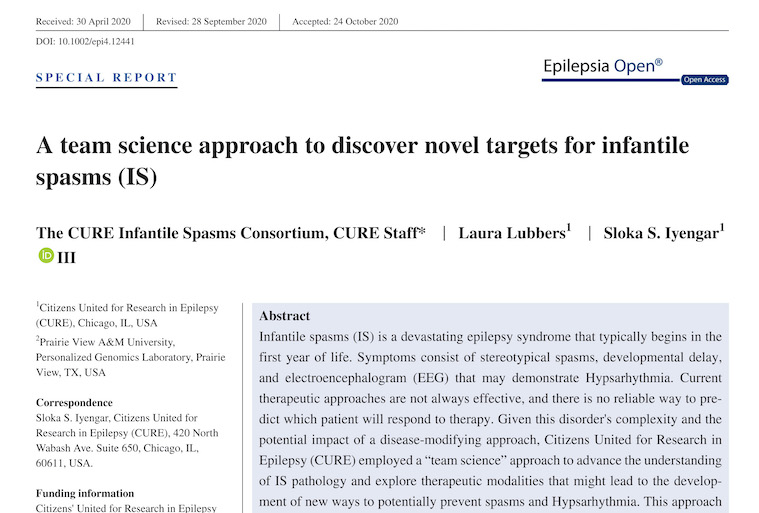Abstract
Infantile spasms (IS) is a devastating epilepsy syndrome that typically begins in the first year of life. Symptoms consist of stereotypical spasms, developmental delay, and electroencephalogram (EEG) that may demonstrate Hypsarhythmia. Current therapeutic approaches are not always effective, and there is no reliable way to predict which patient will respond to therapy. Given this disorder’s complexity and the potential impact of a disease‐modifying approach, Citizens United for Research in Epilepsy (CURE) employed a “team science” approach to advance the understanding of IS pathology and explore therapeutic modalities that might lead to the development of new ways to potentially prevent spasms and Hypsarhythmia. This approach was a first‐of‐its‐kind collaborative initiative in epilepsy. The IS initiative funded 8 investigative teams over the course of 1‐3 years. Projects included the following: discovery on the basic biology of IS, discovery of novel therapeutic targets, cross‐validation of targets, discovery of biomarkers, and prognosis and treatment of IS. The combined efforts of a strong investigative team led to numerous advances in understanding the neural pathways underlying IS, testing of small molecules in preclinical models of IS and generated preliminary data on potential biomarkers. Thus far, the initiative has resulted in over 19 publications and subsequent funding for several investigators. Investigators reported that the IS initiative generally affected their research positively due to its collaborative and iterative nature. It also provided a unique opportunity to mentor junior investigators with an interest in translational research. Learnings included the need for a dedicated project manager and more transparent and real‐time communication with investigators. The CURE IS initiative represents a unique approach to fund scientific discoveries on epilepsy. It brought together an interdisciplinary group of investigators—who otherwise would not have collaborated—to find transformative therapies for IS. Learnings from this initiative are being utilized for subsequent initiatives at CURE.
